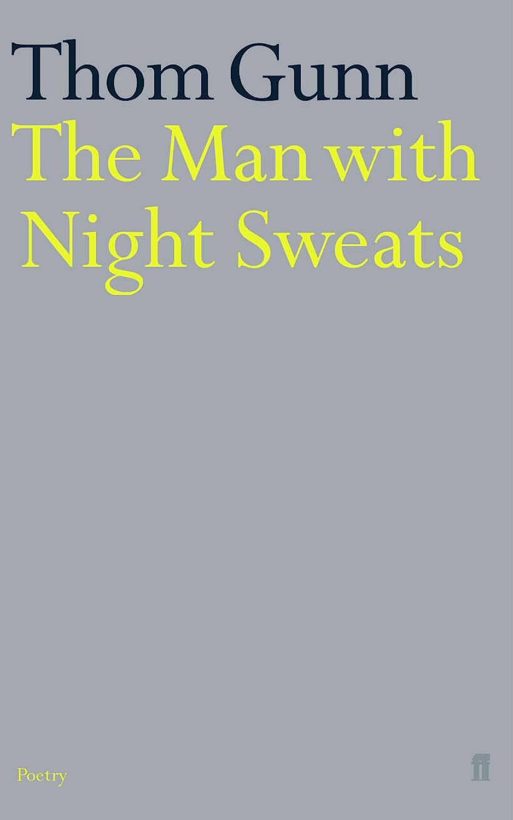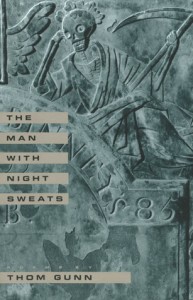 Thom Gunn’s The Man with Night Sweats (1992) memorializes a San Francisco poet’s tragic losses due to AIDS. An “Anglo-American poet” known for his brainy yet visceral formal verse, the late British expatriate often wrote in meter and rhyme about his countercultural daily life in California, filling his poems with surfers, motorcyclists, LSD, popular icons, literature, and gay men. So when AIDS emerged and he lost an overwhelming number of his friends, Gunn had crafted a language for the body and a tough, stoic voice. These defining aspects of his style were perfectly wrought for the task at hand—to preserve the stories of how his loved ones left this world.
Thom Gunn’s The Man with Night Sweats (1992) memorializes a San Francisco poet’s tragic losses due to AIDS. An “Anglo-American poet” known for his brainy yet visceral formal verse, the late British expatriate often wrote in meter and rhyme about his countercultural daily life in California, filling his poems with surfers, motorcyclists, LSD, popular icons, literature, and gay men. So when AIDS emerged and he lost an overwhelming number of his friends, Gunn had crafted a language for the body and a tough, stoic voice. These defining aspects of his style were perfectly wrought for the task at hand—to preserve the stories of how his loved ones left this world.
Although most of his poems recall individual friends, his carefully observed portraits of their illnesses are crafted in such precisely observed detail as to become universal. Gunn eschews self-reflection and focuses on his friends’ deaths, as he does in “Lament”: “Your dying was a difficult enterprise / First, petty things took your energies, / The small but clustering duties of the sick, / Irritant as the cough’s dry rhetoric” (1-3). Even in a more introspective poem, such as “The Man with Night Sweats”, the poet speaks not from his own experience, but imagines a friend near the end of life:
I have to change the bed,
But catch myself instead
Stopped upright where I am
Hugging my body to me
As if to shield it from
The pains that will go through me,
As if hands were enough
To hold an avalanche off (17-24).
However harrowing these vignettes may be, the last two poems, “Death’s Door” and “A Blank” close the series on a hopeful note. In the former, the departed long for the life on earth, once “weaned / From memory briefly barracked in,” they join the rest of the dead in peace (47-48). In the latter, a survivor of the epidemic decides “To educate, permit, guide, feed, keep warm, / And love a child to be adopted, though / The child was still a blank then on a form,” or a new human life full of potential (26-28). The dead find their place. Life returns to innocence and youth.
But Gunn never weeps, neither for joy nor sorrow. Such tragic subject matter could easily inspire maudlin effusions, but Gunn’s tone remains subdued, his perspective judicious; his great emotional restraint takes care of the reader as well as the dead. His compact poems don’t brim with sentimental condolences or self-soothing portraits of a paradisal life after death, but stay poised, candid and devoted to those who deserve a well-composed commemoration.
Thom Gunn found a respectful way to save a glimpse of a man gone before his time. He enshrines a shattered community that nevertheless distinguished itself, with the sick helping the sick and the living remembering the dying. The Man with Night Sweats is an indispensable cultural artifact for understanding how a community endured incredible loss, but, more importantly, it gives a story of and expression for the everyday trials of illness. He assures us that we can pull through, find strength, and preserve our loved ones in memory.
More on AIDS from SevenPonds:
- AIDS at 30 Years — Positive Developments at Last
- The AIDS Crisis and Representations of Heaven in “Angels in America”
- How Can We Support Men and Women Living with AIDS?

 “The Man with Night Sweats” by Thom Gunn
“The Man with Night Sweats” by Thom Gunn




 Our Annual Seven Holiday Gifts for Someone Who Is Grieving, 2024 Edition
Our Annual Seven Holiday Gifts for Someone Who Is Grieving, 2024 Edition

 “Hands Up to the Sky” by Michael Franti & Spearhead
“Hands Up to the Sky” by Michael Franti & Spearhead














